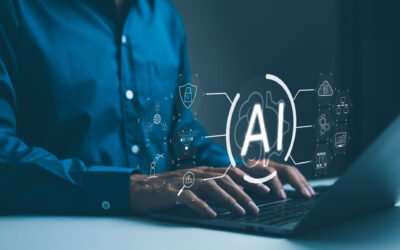When I asked GPT to give me a funny understanding of what AI is, this is what it returned:
“Artificial Intelligence (AI): It’s like having a bunch of digital minions living inside your computer, tirelessly crunching data, trying to imitate human intelligence without getting caught in the act. It’s a high-tech version of pretending to understand your mom’s recipe while secretly Googling what “sauté” means. AI: because even computers need therapy to cope with imposter syndrome.”
Not bad, not great. You may be wondering how it did that, and it does seem to have a sense of humor, which is unnerving because you’re thinking, how does it have a sense of humor if it is not human? Scared? Don’t be as we unpack the conspiracy theory.
AI At Its Core
What is AI? Computer Scientists would argue that AI (Artificial Intelligence) is not the correct word. Most people in technology prefer to use Large Language Models (LLMs) to describe what most people believe is AI. LLMs Can perform a variety of natural language processing (NLP) tasks, such as recognizing, translating, predicting, or generating text or other content. So, how do these LLMs get their information, in other words, Data?
Where does the Data Comes From?
I was going to let ChatGPT explain this, but I didn’t because it would only be entertaining for me.
Data is plentiful. The Research paper introducing the LaMDA (Language Model for Dialogue Applications) model, which Google’s Bard is built on, mentions Wikipedia, public forums, and code documents from websites related to programming and Q&A sites such as REDDIT, tutorials, and the list goes on and on. However, the most prominent companies behind AI (Google, Microsoft, Amazon) and others are mums the word about where they get their data. Like the CIA, we know they exist, but we don’t know what they do and how they do it. In the simplest terms, AI gets its data anywhere it can.
What are LLMs and What Can They Do?
Think of your phone’s annoying autocorrect feature. If you start typing, it likes to finish your sentence; it usually gets it right. Other times, it is frustrating and sometimes amusing. That is an LLM right smack dab in your phone. So, you’ve been using LLM for a bit of time.
Is it Human?
Despite its capabilities, it’s essential to dispel some common misconceptions about AI. Firstly, AI is not sentient. Despite its ability to mimic certain aspects of human intelligence, AI lacks consciousness, self-awareness, and understanding. It operates based on algorithms and data, devoid of emotions or subjective experiences.
Furthermore, AI is not infallible. While it can process vast amounts of data and perform complex tasks with remarkable efficiency, it is still susceptible to errors, biases, and limitations inherent in its design and the data it is trained on.
Impact on Jobs
One of AI’s most significant concerns is its potential impact on employment. It’s undeniable that AI has already begun to reshape the labor market, automating routine tasks and augmenting the capabilities of workers in various industries.
Specific jobs are indeed at risk of being displaced by AI, particularly those involving repetitive, predictable tasks that can be easily automated. Roles in manufacturing, administrative support, transportation, and customer service may be particularly vulnerable.
However, it’s essential to recognize that AI also creates new opportunities and demands for different skill sets. Jobs requiring creativity, critical thinking, emotional intelligence, and human interaction are less likely to be automated. Moreover, AI has the potential to enhance productivity, streamline processes, and enable workers to focus on higher-value tasks.
In recent news, an AI-enabled workforce Consortium has been formed by six companies, including Microsoft, Indeed, and Google, to help those who will lose their jobs or have lost their jobs to AI. You can read more about that:
https://www.msn.com/en-us/money/technology/tech-giants-hatch-a-plan-for-ai-job-losses-reskill-95-million-in-10-years/ar-BB1l64ce?ocid=socialshare
We will dive deeper later to discuss older workers and how you can save yourself if AI takes over your job.
Will AI Take Over the World?
The notion of AI taking over the world as we know it is often sensationalized in popular media and culture. While it’s true that AI presents significant challenges and raises ethical concerns, the idea of AI achieving dominance or consciousness akin to science fiction remains speculative and unrealistic.
AI systems are designed and controlled by humans, and their capabilities are ultimately limited by the parameters set by their creators. Concerns about AI surpassing human intelligence and autonomy are more philosophical than practical at this stage.
However, it’s crucial to approach the development and deployment of AI with caution and foresight. Safeguards must be implemented to ensure that AI systems are used ethically, transparently, and responsibly. This includes addressing biases in data, ensuring accountability for AI decisions, and prioritizing human well-being and safety.
In conclusion, AI is a powerful and transformative technology with the potential to revolutionize nearly every aspect of society. While it presents challenges and uncertainties, it offers immense opportunities for innovation, economic growth, and societal progress. By understanding what AI truly is, acknowledging its limitations, and proactively addressing its implications, we can harness its potential for the benefit of humanity.
We will talk later about ChatGPT and how to use it for work and everyday. If you think you will never have a use for it. You might be surprised.
Related Articles
Are The Kids Alright?
If you have grandchildren or teenagers and have been paying attention, you've likely noticed the growing concern about social media and its potential negative impact on teens' mental well-being. This is not a passing trend but a pressing issue that demands our...
Risks of Teen Internet Use
Risks and Dangers of Unsupervised Teen Internet Use? Teens today grow up with the internet at their fingertips – a world of information, social connection, and entertainment. Yet with all its benefits, the online world also harbors serious pitfalls for an...
The Future is NOW
AGI Is Here: Navigating the Future with Mo Gawdat and Salim Ismail As we stand on the brink of a new era, the discussions surrounding Artificial General Intelligence (AGI) are becoming increasingly urgent. In a recent engaging conversation, Mo Gawdat, Peter...
AI in 2025: Breakthrough Innovations Shaping Our Future
Well, 2025 is here. It is one of those inevitable situations; we as a country turn the page to a new year. So, everyone wants to know what will happen in 2025. I know that many seniors are uncomfortable, and not knowing causes fear. Besides, a new president will take...






